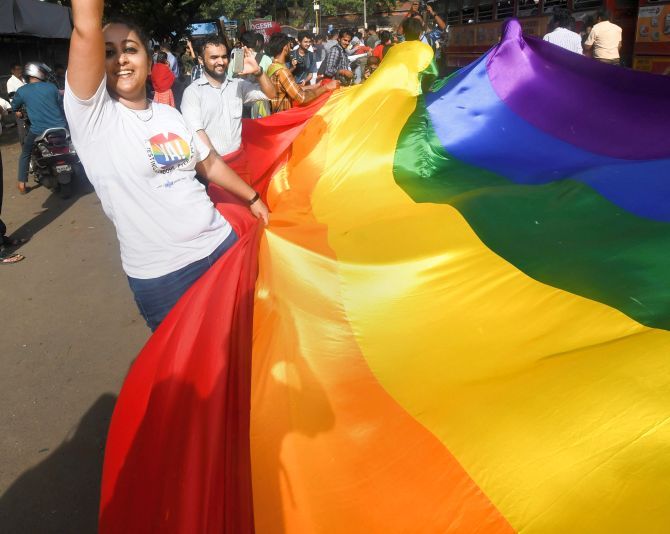Two path-breaking past verdicts, holding right to privacy as a fundamental right and granting 'third gender' status to transgenders, have been heavily relied upon by the Supreme Court in its judgment decriminalising consensual gay sex in private.

A five-judge constitution bench headed by Chief Justice Dipak Misra unanimously struck down partially the British-era penal law that criminalised the consensual sexual acts.
Four concurring verdicts, penned by the CJI, Justices R F Nariman, D Y Chandrachud and Indu Malhotra, extensively relied upon a 2017 nine-judge bench verdict in the K S Puttaswamy case that accorded privacy rights the status of a fundamental right.
The judges also took note of another apex court judgment in the National Legal Services Authority case holding that the right to gender identity and sexual orientation were available to transgenders "just like men and women".
CJI Misra, in the lead judgment, said "after the nine-Judge bench decision in Puttaswamy, the challenge to the vires (validity) of Section 377 IPC has been stronger than ever."
He then went on to say that the privacy judgment held that "sexual orientation is also a facet of a person's privacy and that the right to privacy is a fundamental right under the Constitution of India".
The CJI used the privacy judgment in demolishing the 2013 verdict of the apex court that had re-criminalised the consensual sexual acts between two adults on the ground that the rights of "miniscule" minority was being infringed.
"After the privacy judgment..., the right to privacy has been raised to the pedestal of a fundamental right. The reasoning in Suresh Koushal (verdict), that only a minuscule fraction of the total population comprises of LGBT community, and that the existence of Section 377 IPC abridges the fundamental rights of a very minuscule percentage of the total populace, is found to be a discordant note.
"The said reasoning in Suresh Koushal, in our opinion, is fallacious, for the framers of our Constitution could have never intended that the fundamental rights shall be extended for the benefit of the majority only and that the Courts ought to interfere only when the fundamental rights of a large percentage of the total populace is affected...".
The court said the right to privacy has the facet of life and personal liberty protected under Article 21.
"In view of the authorities, we have no hesitation to say that Section 377 IPC, in its present form, abridges both human dignity as well as the fundamental right to privacy and choice of the citizenry, howsoever small," the CJI held.
The apex court gave equal weightage to the NALSA judgement that had considered he right to gender identity and sexual orientation.
The NALSA verdict had said that just "like men and women, transgenders could enjoy all the fundamental rights that other citizens of India could enjoy.
"In National Legal Services Authority case ..., this Court noted that gender identity is an important aspect of personal identity and is inherent to a person. It was held that transgender persons have the right to express their self-identified gender by way of speech, mannerism, behaviour, presentation and clothing," Justice Indu Malhotra said.
Justice R F Nariman quoted the privacy judgement and said "a nine-Judge Bench of this Court unanimously declared that there is a fundamental right of privacy which enured in favour of all persons, the concomitant of which was that the right to make choices that were fundamental to a person's way of living could not be interfered with by the State without compelling necessity and/or harm caused to other individuals."
Justice Chandrachud, who had written the lead verdict in the privacy matter, also quoted his own judgement while decriminalising the consensual gay sex.
"Given our judgment in Puttaswamy, in particular, the right of every citizen of India to live with dignity and the right to privacy including the right to make intimate choices regarding the manner in which such individual wishes to live being protected by Articles 14, 19 and 21, it is clear that Section 377, insofar as it applies to same-sex consenting adults, demeans them by having them prosecuted, instead of understanding their sexual orientation and attempting to correct the centuries of stigma associated with such persons," Justice Chandrachud said.











 © 2025
© 2025